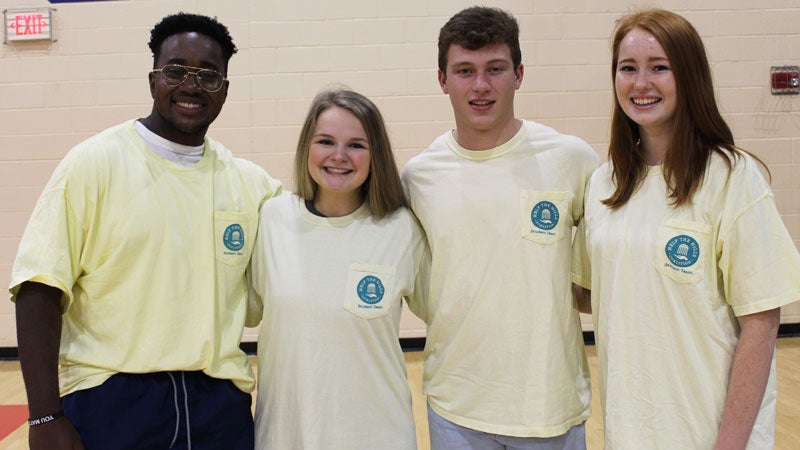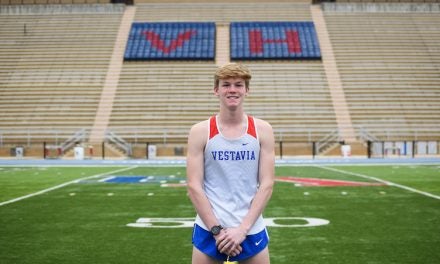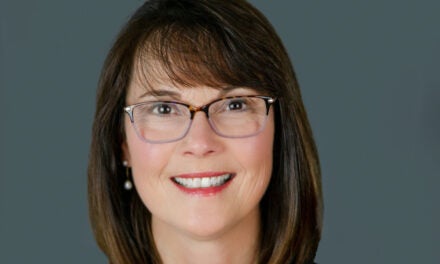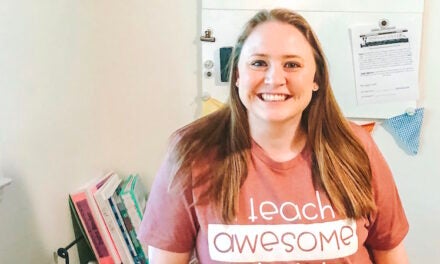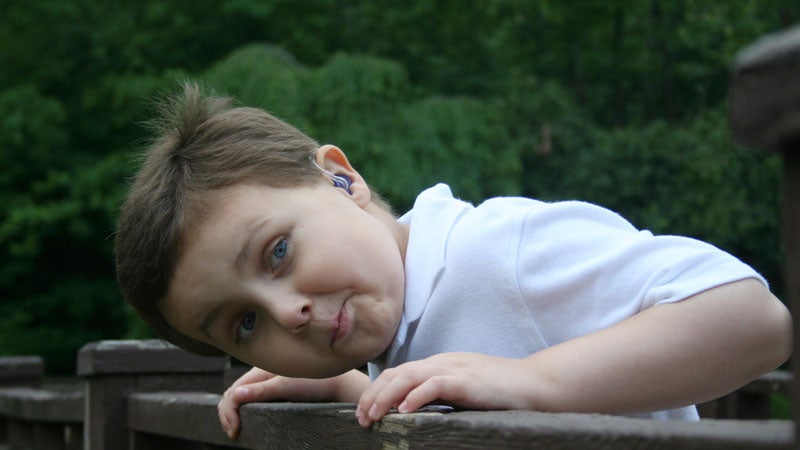This fall 90 Vestavia Hills High School juniors and seniors took a pledge—not to drink, not to smoke, not to vape. The Help the Hills Student Team pledge is for themselves but also for their peers and those younger than them, to model that you don’t have to do those things to enjoy high school. To learn more about what it looks like to be a part of this team, now in its third school year under the Help the Hills Coalition and Youth Leadership Vestavia Hills umbrellas, we chatted with its co-chairs Annie Dodd and Jordan Henson and members Stella Ross and Caleb Leak.
Why did you choose to be a part of Help the Hills?
Jordan: My parents are Southern Baptist, so they hammered it in not to drink. As I entered the high school, I saw some of my friends who had believed the same as me stray away and take a different path. As I watched them, I saw how their character changed and how they were struggling. As soon as I heard of Help the Hills, I thought that’s where I need to be because I want to help people like my friends before they have to make that decision.
Stella: I firsthand have had family members who were subject to addiction, and one who passed away because of it. I just promised myself I was never going to take that path because I saw how that hurt my family. I am going to take a different road and have a different trajectory and maybe inspire someone else to not take part in those actions because of how harmful that is.
Caleb: I wanted to take the action to make sure I am held accountable. I have family members who have suffered from addiction, and I have a best friend whose brother died of substance abuse.
Annie: I joined Help the Hills as an accountability group because it gave me an excuse instead of just saying “no” because sometimes when you say “no” people will peer pressure you more into it. I have a family history of addiction, and I knew if I started drinking in high school it would be downhill.
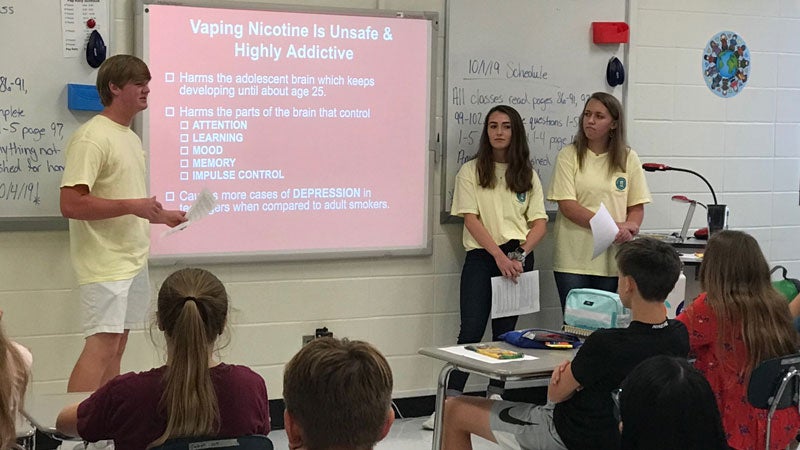 Can you talk some about your group’s interaction with eighth graders at Pizitz Middle School and Liberty Park Middle School?
Can you talk some about your group’s interaction with eighth graders at Pizitz Middle School and Liberty Park Middle School?
Annie: We focus on the eighth graders because we think if they make the choice earlier it’s easier to say no. We go in groups of three into homerooms, and we just give them a talk on vaping and facts that show how bad it is for them. We help them get adjusted to high school knowing that there are people at the high school who don’t drink, and that they don’t have to do it. It’s a choice we all make and we don’t have regrets from it, and they can too.
Stella: I have a brother who is in eighth grade, and he said the general idea after we left from the vaping talk is that they didn’t realize what they were doing. I think that awareness we raise is critical to putting them on the right path.
Annie: We tell the eighth graders some of the things we are involved in and tips about the high school, and they ask questions. I still talk to some of the kids who were in the homeroom I met with last year, and I know their names. It’s cool to see we did have an impact on them. One time we ate lunch with them at their tables, so we got to seek out kids who maybe didn’t get to sit with someone who was super close to them.
What have you seen in this year’s freshmen that you worked with as eighth graders last year?
Jordan: Walking through the halls I’ll have random freshmen come up to me and say, “Hey, you talked to my class.” Last year I thought those eighth graders weren’t going to listen, but they are truly listening and getting engaged. When we talked about vaping, you could see their eyes widen because they had never heard some of these statistics.
Caleb: I had a freshman this year tell me she learned about vaping from us last year, and she was excited to have upperclassmen help take care of them who want them to be healthy.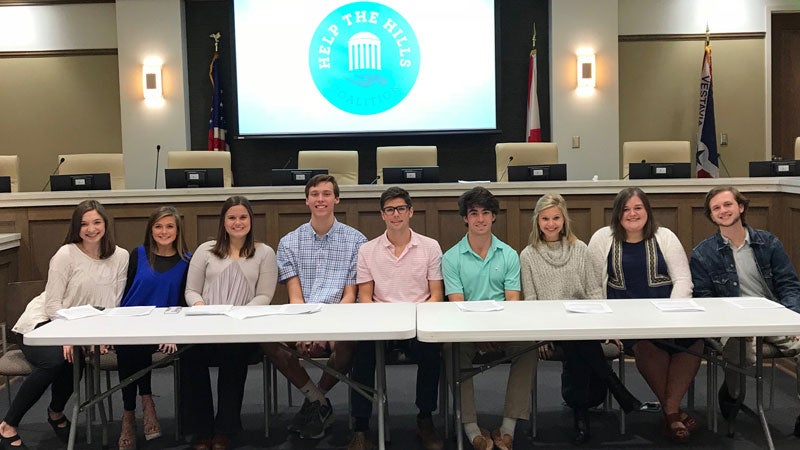
What unique perspective do y’all in Help the Hills have to share with younger students versus others who could speak to these topics?
Stella: It’s a really diverse group. We have kids in theatre, football players, cheerleaders, people from every single group, and we show them there are football players who don’t drink, kids in theatre who don’t drink, kids in band who don’t drink. It shows them they have somebody and they don’t have to drink to fit in.
Jordan: You can go speak to anybody, but if they see you living what you are teaching, it’s going to make so much more of a difference. They come to the high school and see that we are actually doing that and that we don’t drink and don’t vape, so they know they can do it too.
At the end of the school year, your class shares a set of 10 “Why I Don’t Drink” speeches at each middle school in an assembly with all the eighth graders. What was that like last year?
Annie: It was probably the hardest thing I have ever done because I was sharing my story that probably five people in Help the Hills had heard, and for 300 kids to hear it was a big moment in my life and in the healing process for me. You can see on some kids’ faces that they can relate to my story, that it’s happened to them.
Jordan: I went to Pizitz and remember people coming and talking about why they didn’t drink. As I was sitting there, I was thinking, “I have made it this far. These people talked to me, so I need to talk to these eighth graders.”
Annie: I feel like the whole Help the Hills team came together as a family and really loved on every single person who gave their speech. I have never looked at 500 people and felt like it was family, but I really did in that room. We band together for one great reason.
Stella: Some people feel ashamed to talk about these topics, but I think it’s important we take that stigma away. Addiction is common and it is a disease, and it’s okay to talk about it and okay to hurt from it.
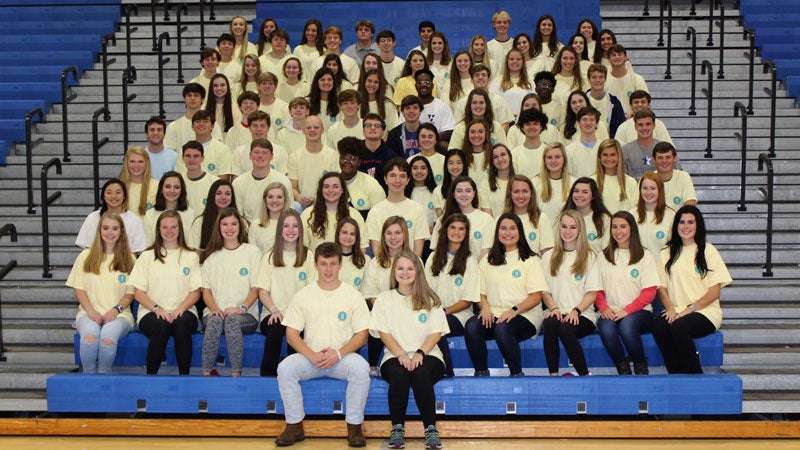 Each person in Help the Hills signs a pledge not to drink, smoke or vape. What kind of dynamic does that create within the group?
Each person in Help the Hills signs a pledge not to drink, smoke or vape. What kind of dynamic does that create within the group?
Jordan: When you look around in that class at the faces, it’s comforting to know that you are not the only one making these decisions, that you are not alone. When I was in eighth grade, all my friends said there’s no way to get through high school without drinking. For me it was like looking at a mountain, and I didn’t know how I was going to get through it. But when you see 90 people who are making the same decisions you are making, you know you can actually do it.
Stella: When you come into high school, friend groups change, and people you thought had the same beliefs as you are now doing that. It’s comforting to have these people who have pledged to not do these things.
What impact do you think Help the Hills has on the junior and senior classes?
Annie: This year we have focused on accountability groups, so every member of Help the Hills student team has an accountability group that ranges from two to 15 people. That’s a really great way we are making Help the Hills bigger than just the student team. The accountability groups have over 225 people in them, plus our 90 members. I can see a difference in my accountability group because they influence their friends too. It’s a chain reaction.
Stella: The way I like to think about Help the Hills is when you drop something in the pond that ripples out, we are that rock that is dropped, and through our actions and accountability groups it spreads and hopefully it can reach everyone in some aspect. Maybe it can lead someone to a healthier life.

